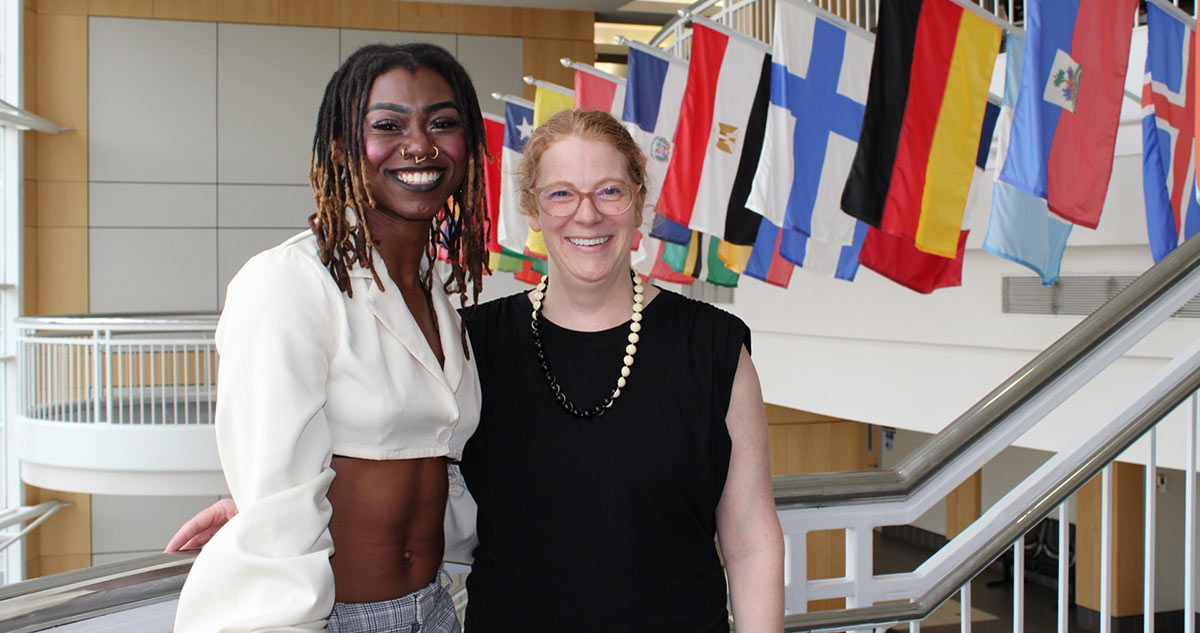Sociology graduate student Nakaja Weaver is about to wrap up a research project that allowed her to blend her passion for art with her quest for knowledge.
Weaver seized the opportunity to turn her interests into a full-fledged project after taking a class with her academic advisor, Dr. Abby Templer Rodrigues.
“I began this research project after taking a class on public sociology and community (SOC 398),” Weaver said. “In that course, we discussed topics about community, social capital and inequality.”
Weaver launched her project, titled “The Impact of Social Media Algorithms on Black Artists Through a Black Feminist Lens,” in May 2023.
This April, she will discuss her findings by presenting a paper at the Midwest Sociological Society conference and then give a poster presentation at the Missouri Academy of Science conference.
Weaver also hopes to publish her finished work in an academic journal.
Researching the impact of social media algorithms on Black artists
Weaver, who plans to pursue a doctorate in sociology, is interested in race, gender, art studies and Black feminism. She said her research project has allowed her to examine these interests while practicing several professional research skills.
“This research allows me to use qualitative research methods, gain more experience with Black feminist methodology and epistemology and advocate for an oppressed group of people,” she explained.
Weaver’s research builds on previous studies of algorithmic bias and oppression by looking specifically at the experience of Black artists on social media.
“I was initially going to do a broader study about artists on social media, but due to time restrictions, I narrowed the study down to Black artists,” Weaver said.
“When considering the experiences of Black artists on social media platforms, there are [few] to no studies,” Weaver added. “However, there are quite a few about algorithmic oppression and bias.”
Using a Black feminist lens to frame her research questions, Weaver has been exploring the intersectional biases Black artists might experience from social media algorithms, especially Instagram and TikTok.
“I learned a lot about algorithms and their contribution to the digital marketing era for artists,” Weaver said. “It is very interesting to see how machine learning, AI and social media algorithms can display the same racial, gender and sexual orientation biases that exist in the real world.”
Weaver gave credit to her advisor, Templer Rodrigues, for both inspiring the project and her support during the process.
“After reading parts of her dissertation and published works about the artistic labor market, I became curious about how the artistic labor market has changed now that artists utilize social media to share their work,” Weaver said.
“I enjoy working with Dr. Templer Rodrigues on this study,” Weaver added. “She has been a great mentor and advisor throughout this process.”
Research built on personal experience
Weaver, who is herself a Black artist, has at times experienced difficulty sharing her social media content. She pinpointed TikTok as specially problematic for flagging and removing her work for reasons such as “poor quality” or suitability.
“I usually respond and write an appeal when my posts are removed,” Weaver said. “But I also don’t always recognize when my posts are removed, and TikTok usually never responds anyway. I either post my content on a different platform, or I repost it on TikTok to see if that will yield a different result.”
Weaver has used a variety of methods to gather research participants, such as creating a two-minute TikTok video explaining algorithm bias. She used the video to spark conversations among Black artists about algorithm bias.
Weaver also used more traditional methods to identify research participants, including distributing a flyer on social media and employing “snowball sampling,” a method that asks participants to refer additional participants to the study.
Her study includes three focus groups with a minimum of four participants for each. She conducts these discussions via Zoom. “I aim to have around 12-15 participants total,” she said.
Weaver then spends time collating and analyzing the results.
“After each focus group, I must transcribe, analyze and code the data,” Weaver said. “It might take me about a week to analyze all the data, but it depends on when I complete all my focus groups.”
Weaver will round up her study with a post-focus group survey.
Stories matter
Weaver hopes her findings illuminate what Black artists have experienced with algorithm bias while developing strategies they can use to overcome it.
“I hope to share the stories of artists who have been harmed or who have experienced bias from the algorithm because their stories matter,” Weaver said. “I want Black artists to be able to speak against their oppression because algorithm bias is connected to issues like cultural appropriation and artist pay gaps between races.”
“I am listening to the experiences of Black artists to give them a voice to speak up and find solutions to get around algorithmic oppression.”

